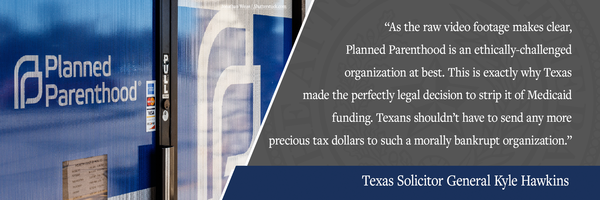On behalf of Attorney General Ken Paxton’s office, Texas Solicitor General Kyle Hawkins presented oral arguments today before the entire U.S. Court of Appeals for the 5th Circuit, demonstrating that individual Medicaid recipients cannot use lawsuits to force taxpayer funding of Planned Parenthood. In 2016, the Inspector General of Texas Health and Human Services removed Planned Parenthood from the state’s Medicaid program based on video footage of Planned Parenthood employees admitting to conduct that “violate[s] generally accepted medical standards” and for making false statements to law enforcement.
Last year, Attorney General Paxton’s legal team presented oral arguments in the same case before a three-judge panel of the 5th Circuit. It recounted raw, unedited video footage depicting Planned Parenthood officials describing how employees in the organization had violated federal law and medical ethical standards when they performed abortions to obtain fetal tissue for their own medical research and would manipulate the abortion procedure to get more intact fetal cadavers.
In January, the panel sided with Texas by overturning a federal district court’s earlier injunction, ruling that the district court had used the wrong legal standard, and sending it back for reconsideration. But the panel nevertheless held that existing precedent gave the individual plaintiffs a right to challenge the state’s decision.
In today’s hearing, Solicitor General Hawkins explained to the entire 5th Circuit why this precedent is incorrect. Planned Parenthood could have challenged the termination in administrative proceedings, but chose not to do so. Instead, it enlisted a handful of patients as plaintiffs and filed a federal lawsuit, something the Medicaid Act does not permit.
“As the raw video footage makes clear, Planned Parenthood is an ethically-challenged organization at best. This is exactly why Texas made the perfectly legal decision to strip it of Medicaid funding,” Solicitor General Hawkins said. “Texans shouldn’t have to send any more precious tax dollars to such a morally bankrupt organization.”
The concurring opinion in the original 5th Circuit panel decision requested the full court to rehear this aspect of the case. The full court granted rehearing on its own motion in a February order.

